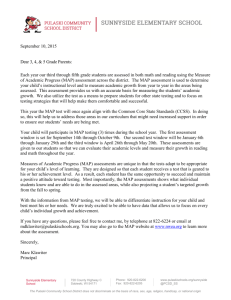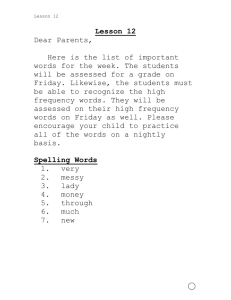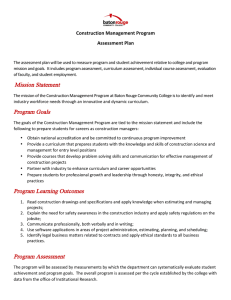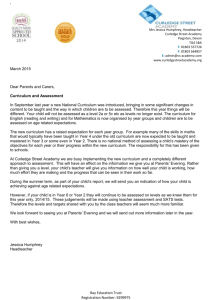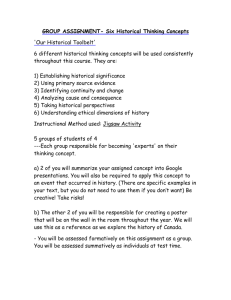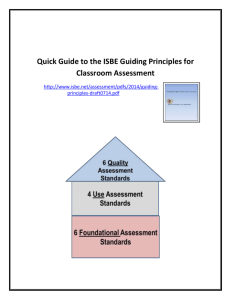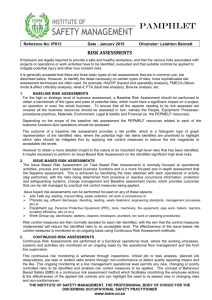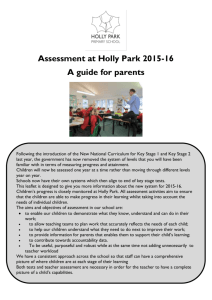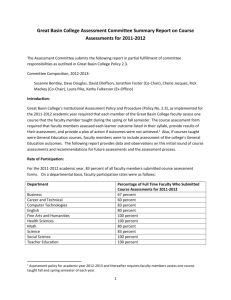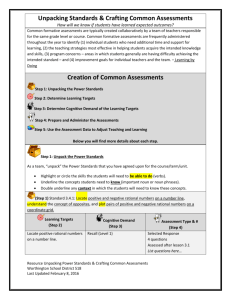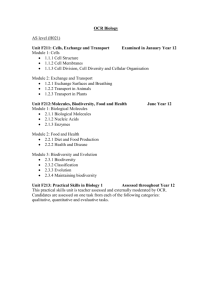The new national curriculum - Bird`s Bush Primary School
advertisement
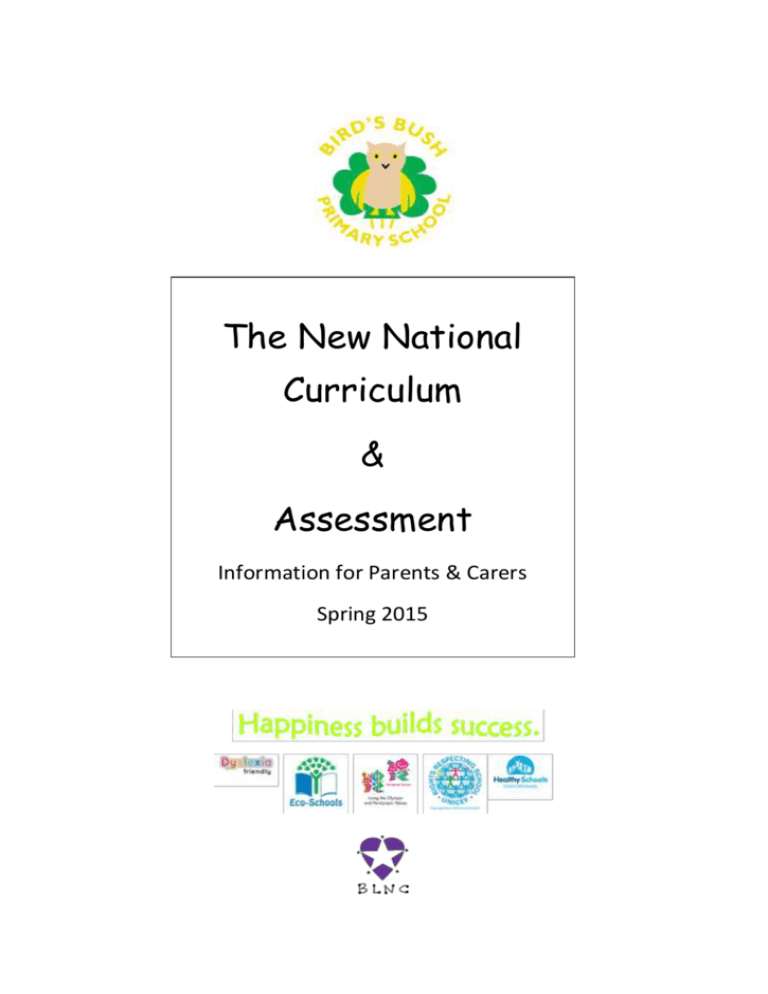
The New National Curriculum & Assessment Information for Parents & Carers Spring 2015 The new National Curriculum A guide for parents For generations, parents have found themselves visiting primary schools with their children only to hear themselves saying, “It’s not like when I was at school.” Things change quickly in education, and at no time in the past 25 years has that been truer than from September 2014 when the whole school curriculum changed for maintained schools throughout England. What’s changed? English, Maths and Science remain very important and are considered the core subjects in both primary and secondary education. The National Curriculum sets out in some detail what must be taught in each of these subjects, and they will take up a substantial part of your child’s learning week. Alongside these are the familiar foundation subjects: Art, Computing, Design & Technology, Modern Foreign Language (French in the Juniors) Geography, History, Music, and Physical Education. For these foundation subjects, the details in the curriculum are significantly briefer: schools have much more flexibility regarding what they cover in these subjects. RE remains a statutory subject. Much of the publicity about the changes to the curriculum has focussed on ‘higher expectations’ in various subjects, and it is certainly the case that in some areas the content of the new primary curriculum is significantly more demanding than in the past. For example, in mathematics there is now much greater focus on the skills of arithmetic and also on working with fractions. In science, a new unit of work on evolution is introduced for Year 6; work which would have previously been studied in secondary school. In English lessons there will now be more attention paid to the study of grammar and spelling; an area which was far less notable previously. Children in Year 2 & Year 6 The new curriculum began in schools from September 2014. However, for children in Year 2 and Year 6, the new curriculum won’t become statutory until 2015. This is because these children are in the last year of the Key Stages and children are formally assessed. Because the 2014 curriculum will only have been in place for nine months, these children will be assessed against the requirements of the old curriculum in the National Curriculum Tests. New tests will be produced for the summer of 2016 to assess work from the new curriculum. Tests your child will take Lots of schools use tests at all stages of their work. For the most part, these are part of a normal classroom routine, and support teachers’ assessment. However, at certain stages of schooling there are also national tests which must be taken by all children in state schools. Often informally known as ‘SATs’, the National Curriculum Tests are compulsory for children at the end of Year 2 and Year 6. Children in these year groups will undertake tests in Reading, Mathematics, and Grammar, Punctuation & Spelling. The Year 6 tests are sent away for marking, and results will be reported to schools and parents at the end of the year. The new National Curriculum Tests for children in Year 2 and Year 6 will take place each summer from 2016. Schools may also choose to have internal tests for other year groups around the same time. From 2016 the tests will be reported as a scaled score, with a score of 100 representing the expected level for each age group. It will be up to teachers and schools to decide how to measure progress in the intervening years. Schools will then provide accompanying information to parents to explain how children are progressing – it makes attending those parents’ evenings all the more important! Assessment As well as a new curriculum, in September 2014 the Government changed the assessment systems in school. Previously, assessments were graded in levels (normally numbering between Level 1 and Level 6 in primary school with sub levels of a, b, and c) this has now gone and schools are able to design their own assessment framework. The new national Curriculum states what a child should be able to do at the end of each year. These are called ‘End of Year Expectations’ and children will be assessed as to how successfully they have met these expectations. The end of year expectations are higher than what was expected in the old curriculum. Children who need additional help in making progress towards these expectations will have intervention in a range of ways. Teachers are assessing children all of the time, constantly considering how well they have understood their learning and what the next steps should be. We will also be introducing some ‘Standardised Tests’ which children will have termly and will be used to inform teacher assessments. High Achievers If your child is achieving well, rather than moving on to the following year group’s work the new curriculum expects them to be involved in more in-depth and investigative work to allow a greater mastery and understanding of concepts and ideas. End of Year Expectations If your child is in year 1, 3, 4 or 5, a copy of the End of Year Expectations for your child’s year group will be available at parents evening. As year 2 and 6 are currently on the old curriculum these new expectations are not relevant this year, you child’s teacher will be able to answer any questions you have about the expected standards. Information you will get about how your child is doing All schools are currently going through a process of transition, moving away from the old assessment system of levels, to a system that we can design ourselves if we want to, or onto a system that we can purchase from a range of publishers. At the moment we are looking into some different systems and talking to other local schools to decide what we want to do. Teachers are constantly assessing children’s learning and carefully planning what to move onto next. Teachers are using key statements from the new curriculum to say what children are able to do. At parents evening, teachers will be sharing information with you about how well your child is doing. They will discuss if they are ‘on-track to meet the end of year expectations’ or if they are not. If children are ‘not on-track to meet end of year expectations’ they will be having additional intervention in school to support their learning. At the end of the year children will be assessed against the end of year expectations as either: Emerging (not working at the expected level for their age) Expected (working at the expected level for their age) Exceeding (working above the expected level of their age) You will receive more information about these assessments at the end of the year. Children learn and develop at very different rates. The curriculum expectations are much higher now so children are at a lower starting point than they may have been when assessed on the old system of levels. It will take time for teacher assessments to become as accurate and secure using a new system as they were before. They best way to understand how well your child is learning and progressing is to look at their books at parents evening, talk to them about their learning and speak to their teachers.
